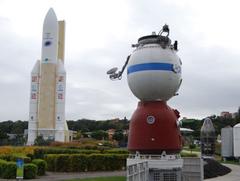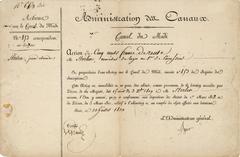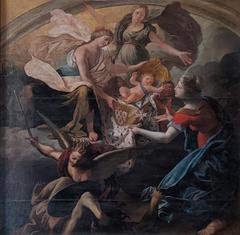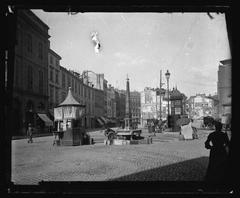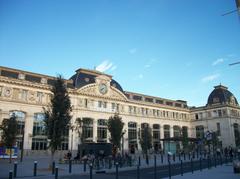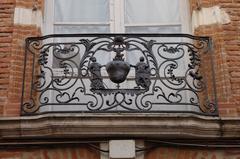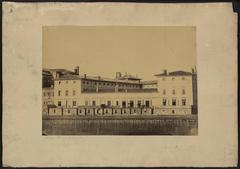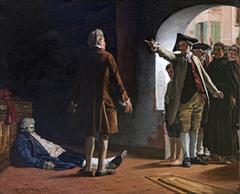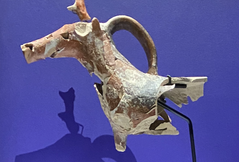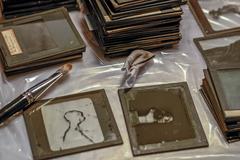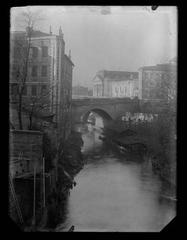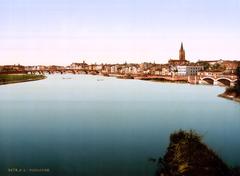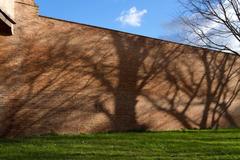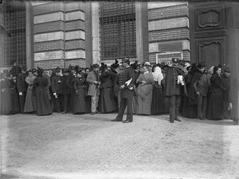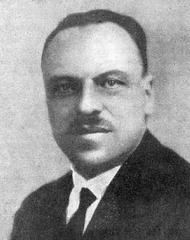
Musée du Vieux Toulouse: Visiting Hours, Tickets, and Historical Sites in Toulouse
Date: 04/07/2025
Introduction
Nestled in the heart of Toulouse’s historic district, the Musée du Vieux Toulouse offers an immersive journey through the city’s rich cultural, social, and architectural heritage. Housed in the Renaissance-era Hôtel Dumay—built between 1590 and 1611 with the iconic red brick and white stone façade—this museum is itself an architectural treasure and a testament to Toulouse’s unique style (musees-occitanie.fr).
Since its founding in 1907 by the association “Les Toulousains de Toulouse,” the museum has preserved and showcased over a thousand artifacts, from decorative arts and textiles to paintings, historical documents, and archaeological finds. Visitors can expect a carefully curated experience that not only chronicles Toulouse’s evolution from antiquity through the 20th century, but also highlights unique events and traditions such as the Calas Affair and the construction of the Canal du Midi (visitplacesfrance.com).
Ideally located near Place du Capitole, the museum is easily accessible and serves as a perfect starting point to explore Toulouse’s historic core.
Table of Contents
- Introduction
- Historical Background and Significance
- Permanent Collections
- Temporary Exhibitions and Special Events
- Practical Visitor Information
- Museum Experience
- Nearby Attractions and Amenities
- Visitor Recommendations and Tips
- FAQ
- Conclusion and Call to Action
- References
Historical Background and Significance
Foundation and Origins
The Musée du Vieux Toulouse was established in 1907 by “Les Toulousains de Toulouse” to safeguard the city’s local identity and patrimony (musees-occitanie.fr). Initially located at Place de la Daurade and later at 6 rue Saint-Jean, the museum found its permanent home in Hôtel Dumay in 1947, allowing for significant expansion and the proper display of its growing collections (monumentum.fr).
The Hôtel Dumay: Renaissance Landmark
Commissioned by Antoine Dumay, physician to Queen Marguerite de Valois, Hôtel Dumay is a prime example of Toulouse’s Renaissance architecture (visit-occitanie.com). The mansion’s interiors, including 18th-century salons and a peaceful cobbled courtyard, offer an authentic historical backdrop to the museum’s exhibits.
Evolution of the Collections
The museum features over a thousand objects representing Toulouse’s multifaceted history:
- Decorative arts: ceramics, textiles, and glassware
- Fine arts: paintings, sculptures, drawings, and photographs
- Historical documents: maps, plans, and engravings
- Local faience and traditional costumes
- Artifacts illustrating daily life, trades, and customs
These are arranged in thematic rooms, each narrating a distinct chapter of Toulouse’s development—from Roman origins and medieval fortifications to civic life, artistic heritage, and industrial advances (visitplacesfrance.com).
Thematic Highlights and Notable Exhibits
Key exhibits include:
- The Calas Affair: Chronicling the infamous 18th-century legal case
- The Pont Neuf: Artifacts and documents on Toulouse’s iconic bridge
- Chapel of the Inquisition: Objects and reconstructions from this period
- Vierge à l’Enfant: Religious sculptures and art
Reconstructions of vanished monuments and displays on local faience and costumes further enrich the narrative (musees-occitanie.fr).
Permanent Collections
Overview and Thematic Rooms
The museum’s permanent collections trace Toulouse’s evolution through:
- Paintings and Portraits: By local artists and depicting prominent Toulousains
- Furniture and Decorative Arts: Showcasing domestic life and changing customs
- Ceramics and Pottery: Reflecting local craftsmanship
- Textiles and Costumes: Illustrating fashion across centuries
- Maps and City Plans: Providing a visual record of urban transformation (WhichMuseum)
Thematic rooms delve into the city’s origins, ancient institutions, vanished monuments, and notable personalities.
Artifacts and Documents
Highlights include Renaissance artifacts, industrial tools from Toulouse’s textile and aeronautics industries, and a wealth of manuscripts and printed materials essential for researchers and history enthusiasts.
Temporary Exhibitions and Special Events
The museum occasionally hosts temporary exhibitions focusing on local themes such as river trade, the French Revolution, and regional crafts. It also participates in major cultural events like European Heritage Days and Nuit des Musées, offering special displays and extended opening hours (Toulousains de Toulouse).
Practical Visitor Information
Visiting Hours
- April to November: Monday to Friday, 14:00–18:00
- Sundays (July, August, September): 14:00–18:00 (except July 14th)
- Closed: Public holidays
Hours may vary during special events; always check the official website before your visit.
Tickets and Booking
- Standard Ticket: €5 (adult)
- Reduced Rate: €3 (students, under 18, unemployed, groups of 10+)
- Free Admission: Children under 10, association members, Toulouse Tourism Pass holders (cityzeum.com, toulouse-tourisme.com)
- Tickets are sold on-site; advance booking is recommended for groups or guided tours.
Accessibility
- The museum is housed in a historic building: upper floors are accessible only by stairs, with no elevator (guide-toulouse-pyrenees.com).
- Ground floor access is available, but wheelchair access is limited.
- Restrooms are present but may not be fully accessible; visitors with specific needs should contact the museum ahead of time (handi.toulouse-tourisme.com).
Getting There
- Address: 7 Rue du May, 31000 Toulouse
- By Metro: Capitole (Line A), Esquirol stations
- By Bus: Multiple lines stop nearby
- By Bike: VélôToulouse stations close by
- By Car: Parking is limited in the historic center; use nearby public car parks (Place du Capitole, Esquirol)
Best Times to Visit
- Early afternoons during weekdays are typically quieter
- Special events may attract more visitors
Museum Experience
Guided Tours & Educational Resources
- Guided Tours: Offered in French, with occasional English tours available by request (Toulousains de Toulouse)
- Educational Programs: Available for school groups and by prior arrangement
- Self-Guided Materials: Brochures and informational panels (primarily in French; some English available)
Atmosphere and Visitor Insights
Visitors appreciate the intimate setting, thoughtfully arranged exhibits, and passionate volunteer guides. The average visit lasts 1–1.5 hours, and the museum’s peaceful ambiance is ideal for history enthusiasts and curious travelers alike (toulousainsdetoulouse.fr).
Nearby Attractions and Amenities
- Place du Capitole: Toulouse’s main square
- Basilique Saint-Sernin: Renowned Romanesque church
- Musée des Augustins: Fine arts museum
- Théâtre du Capitole: Opera house
- Numerous cafés, restaurants, and shops are within walking distance (cityzeum.com).
Visitor Recommendations and Tips
- Best Time to Visit: Early weekday afternoons for a quieter experience
- Photography: Allowed without flash or tripod; confirm with staff on arrival
- Language: Most signage in French; advance request for English tours recommended
- Family-Friendly: Activity booklets and occasional workshops for children
- Combine Visits: Plan stops at nearby museums and historical sites
Frequently Asked Questions (FAQ)
Q: What are the Musée du Vieux Toulouse visiting hours?
A: Generally Monday to Friday, 14:00–18:00 (April–November), with Sundays open in summer months. Always check the official site for updates.
Q: How much are tickets?
A: Standard adult tickets are €5; reduced rates are €3. Free entry for children under 10 and Toulouse Tourism Pass holders.
Q: Is the museum wheelchair accessible?
A: Access is limited—upper floors require stairs. Contact the museum in advance to discuss accommodations.
Q: Are guided tours available in English?
A: Primarily in French, with English tours by request.
Q: Can I take photos inside?
A: Yes, for personal use and without flash or tripod.
Conclusion and Call to Action
The Musée du Vieux Toulouse is a window into the city’s vibrant history, housed in one of its most beautiful Renaissance buildings. With affordable tickets, a central location, and a collection that spans centuries, it’s a must-visit for anyone interested in Toulouse’s heritage.
Plan your visit by checking current hours and ticket options on the official museum website. For deeper engagement, join a guided tour and explore nearby historical sites. Enhance your experience with the Audiala app for self-guided tours and updates, and follow us on social media for the latest news and travel tips.
Step into Toulouse’s past at the Musée du Vieux Toulouse—a cultural treasure at the heart of the city.
References
- Visiting Musée Du Vieux Toulouse: Hours, Tickets, History, and Nearby Attractions, 2025 (musees-occitanie.fr)
- Musée du Vieux Toulouse Visiting Hours, Tickets, and Historical Collections – Explore Toulouse’s Rich Heritage, 2025 (whichmuseum.com)
- Musée Du Vieux Toulouse Visiting Hours, Tickets, and Visitor Guide to Toulouse Historical Sites, 2025 (toulousainsdetoulouse.fr)
- Musée du Vieux Toulouse Visiting Hours, Tickets, and Visitor Guide to Toulouse Historical Sites, 2025 (toulouse-tourisme.com)
- Explore Toulouse Historical Landmarks, 2025 (visitplacesfrance.com)
- Hôtel Dumay – Renaissance Landmark, 2025 (visit-occitanie.com)


